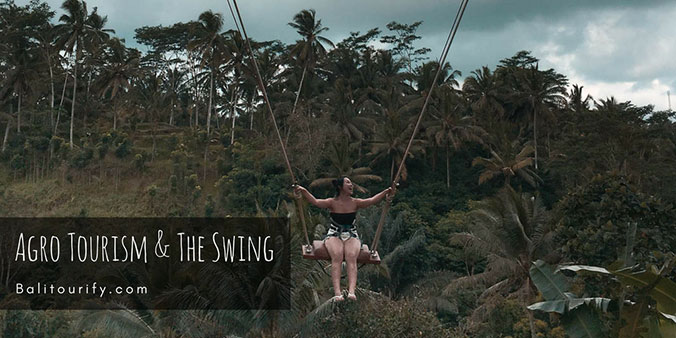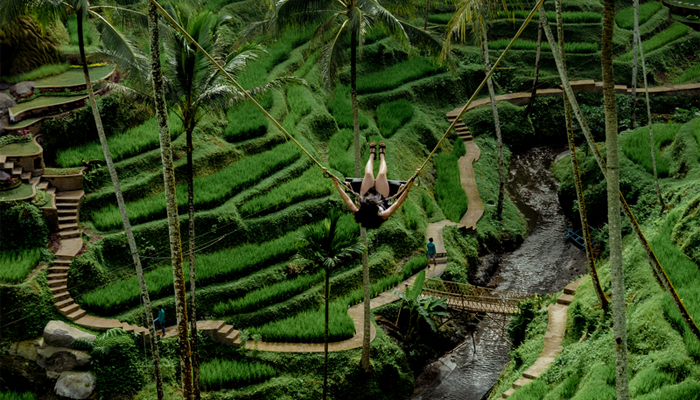Checking Out Sustainable Travel: The Increase of Agrotourism in Ubud
Checking Out Sustainable Travel: The Increase of Agrotourism in Ubud
Blog Article
Checking Out the Abundant Culture and Breathtaking Landscapes of Agrotourism in Ubud
Ubud, often commemorated as the heart of Bali, offers an one-of-a-kind opportunity for those looking for to experience agrotourism that seamlessly mixes cultural richness with stunning landscapes. This interesting location supplies an array of activities, from involving with the elaborate craftsmanship of regional craftsmens to checking out the green rice balconies that specify the area's agricultural heritage. As travelers browse via Ubud's vibrant tapestry of customs, they are invited to uncover the stories behind each social method and landscape feature. What lies below the surface of this fascinating experience is a detailed web of heritage and nature awaiting exploration.
Discovering Ubud's Cultural Heritage
Snuggled in the heart of Bali, Ubud functions as a dynamic epicenter for those anxious to look into the island's abundant cultural heritage. Understood for its artistic traditions, Ubud is a center where ancient techniques meet modern-day expressions, developing an unique tapestry of cultural experiences. Site visitors are drawn to its myriad of holy places, galleries, and workshops, each providing a look into Bali's creative and historical legacy.
Central to Ubud's social appeal is the Ubud Palace, a considerable landmark that stands as a testimony to the region's royal heritage. The palace often hosts standard dancing performances, giving an authentic understanding right into Balinese narration with dance and music. The streets of Ubud are lined with galleries showcasing jobs of both renowned Balinese musicians and arising abilities, reflecting the island's dynamic art scene.

Immersive Agricultural Knowledge

Additionally, Ubud's agrotourism initiatives frequently include workshops on lasting farming practices. These workshops emphasize the importance of natural farming, permaculture, and biodiversity conservation, frequently under the assistance of well-informed experts. They function as an educational system for visitors, promoting a deeper recognition for the ins and outs of sustainable farming.
Furthermore, visitors can check out coffee and cocoa haciendas, where they learn more about the procedures of growing and production. Assisted trips provide thorough explanations of each action, from bean to cup or cacao hull to delicious chocolate bar, enhancing the total understanding of these significant farming items.
These immersive experiences not only enrich visitors' understanding of Ubud's agricultural heritage however additionally promote lasting tourist techniques, ensuring the conservation of these cultural landscapes for future generations.
Picturesque Rice Terraces and Landscapes
Building on the immersive farming experiences, site visitors are drawn to the fascinating beautiful rice balconies and landscapes that define Ubud's countryside. The iconic Tegalalang Rice Terraces are especially prominent, providing an exquisite screen of Balinese resourcefulness in farming. These terraces are not just useful but likewise act as a testimony to the harmonious connection in between the Balinese individuals and their environment. The subak watering system, a UNESCO-recognized social heritage, showcases a old and lasting approach of water monitoring that proceeds to sustain neighborhood farming.
As visitors traverse the winding paths through the terraces, they are met panoramic sights that extend throughout green fields, stressed by guiding coconut hands and the remote shape of Mount Agung. The landscape supplies a calm backdrop that welcomes reflection and admiration of nature's beauty (Agrotourism in Ubud). For those curious about digital photography, the ever-changing light and darkness cast by the dawn or sunset provide many opportunities for capturing magnificent photos
Past the terraces, Ubud's rolling hills and lavish plant life develop a diverse tapestry that beckons expedition. Hiking trails meander through these landscapes, allowing site visitors to get in touch with the land and experience the relaxing rhythm of rural life.
Farm-to-Table Culinary Delights
In the middle of the natural beauty of Ubud's landscapes, the farm-to-table activity provides an authentic culinary experience that attaches site visitors with the region's farming heritage. This strategy commemorates the symbiotic partnership in between the land and its produce, with local farms providing fresh, natural components to Ubud's ingenious chefs. Site visitors are invited to take part in a gastronomic trip where the origins of each active ingredient are transparently showcased.
In Ubud, farm-to-table dining goes beyond mere usage; it ends up being an educational experience. Dining establishments typically offer assisted trips of the ranches supplying their cooking areas, permitting restaurants to witness sustainable farming methods firsthand. This link promotes a much deeper gratitude for the thorough care that goes right into growing the plants and raising click reference livestock.
The cooking offerings show the abundant diversity of Ubud's agricultural landscape, featuring recipes that highlight seasonal fruit and vegetables and traditional Balinese flavors. From vivid salads brimming with exotic greens to aromatic curries infused with fresh natural herbs, each plate is a testimony to the region's abundant harvests.
In addition, the farm-to-table ethos supports regional farmers and areas, making sure that farming practices are protected while advertising economic sustainability. This movement underscores a commitment to quality, sustainability, and the party of Ubud's one-of-a-kind terroir.
Engaging With Local Artisans
Lots of visitors find themselves captivated by the elaborate craftsmanship of Ubud's regional craftsmens, whose job mirrors the area's rich social heritage. These craftsmens, frequently masters of their craft, contribute substantially to Ubud's vivid cultural landscape. From standard batik textiles to thoroughly carved wood artefacts, each piece informs a tale linked with generations of expertise and custom.
Engaging with these artisans provides a special possibility to dive deeper right into Balinese culture. Several workshops use hands-on experiences, where visitors can learn methods given via centuries. These interactive sessions not just foster recognition for the craftsmens' skills however additionally give a meaningful link to the region's background and customs.
Visitors can discover craftsmen towns such as Mas, renowned for its great wood carvings, or Celuk, renowned for elegant silver fashion jewelry. Right here, one can witness the devotion and precision required to develop each work of art. Purchasing straight from these artisans makes certain that the earnings sustain neighborhood areas and maintain standard methods.
In Ubud, engaging with neighborhood artisans is not just a traveler activity; it is an enhancing cultural exchange that improves the agrotourism experience, leaving visitors with a deeper understanding and appreciation of Bali's imaginative heritage. - Agrotourism in Ubud
Final Thought
The expedition of Ubud's agrotourism provides a profound appreciation for Balinese social heritage and natural elegance. The address integration of traditional dance, hands-on farming, and impressive rice terraces produces an unique tapestry of experiences that astound site visitors. The farm-to-table culinary offerings display the area's farming bounty, while interactions with local craftsmens supply insight right into Ubud's abundant artistic customs. Collectively, these aspects cultivate a deeper understanding and admiration of Ubud's sustaining all-natural and cultural allure.
Central to Ubud's cultural appeal is the Ubud Royal residence, a significant site that stands as a testament to the region's royal heritage.Ubud provides a myriad of immersive agricultural experiences that permit site visitors to involve deeply with click site the island's agricultural way of life.Building on the immersive farming experiences, site visitors are attracted to the captivating beautiful rice balconies and landscapes that specify Ubud's countryside.Amidst the natural charm of Ubud's landscapes, the farm-to-table motion offers an authentic culinary experience that links visitors with the region's agricultural heritage.Lots of visitors discover themselves captivated by the complex craftsmanship of Ubud's neighborhood craftsmens, whose work reflects the area's rich cultural heritage.
Report this page